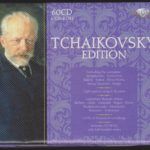LINK CORRIGIDO !!!
Symphony No.5 Op.64
If Tchaikovsky’s talent had been no better than his own assessment of himself, his music would have turned to dust a century ago, dismissed as the mediocre scribblings of a man with nothing to say, for such was his usual view of his own creations. Surviving letters and diaries attest that he rarely had faith in his own abilities. The composer’s own words prove to modern observers his personal conviction that his finished compositions were worthless and future ones might never come to life. In the spring of 1888, Tchaikovsky wrote to his brother about a seemingly insurmountable dry spell. ‘Have I written myself out?’ he laments.
‘No ideas, no inclination?’ Even months later, once he had spent his summer vacation at work on a new symphony, he remained despondent, proclaiming to his patron, Madame Nadezhda von Meck, ‘There is something repellent about it … This symphony will never please the public.’ But Tchaikovsky was wrong. That symphony, that ‘repellent’ work, was his Fifth Symphony, today one of his most-performed
compositions, an epic expression of musical energy and anxiety. This was, for Tchaikovsky, his second consecutive symphony to be based on a central, programmatic theme, a theme that in both cases he imagined as representing Fate. Why the composer found the concept of Fate to be worthy of repeated musical exposition is a question best left to psychologists; musicologists content themselves with a study of how Tchaikovsky, having resolved for whatever reason to explore Fate, goes about that exploration. In his Fourth Symphony, he chose a brass-and-bassoon motto of frightening intensity, like the sudden appearance of a formidable foe. By contrast, his Fifth Symphony is more evocative of the distant rumble of a funeral march, as the clarinets intone a low and somber theme. As the symphony progresses, the theme returns in various guises, sometimes wistful, at other times imposing, but the general motion is toward an increasing mood of optimism, until, in the finale, Tchaikovsky transforms his Fate theme into a triumphal march. This, one feels, is how life truly should be: Fate yielding to mankind’s yearning for a happy ending.
Capriccio italien Op.45 (1880)
A virtuoso showpiece in the pot-pourri style of Glinka, anticipating the picture-postcard Italy of Richard Strauss and Respighi. ‘I believe a good fortune may be predicted,’ Tchaikovsky wrote. ‘It will be effective, thanks to the delightful [folk] tunes which I have succeeded in assembling partly from anthologies, partly through my own ears on the streets’. Reportedly the opening fanfare was based on a trumpet call from the barracks next to the hotel in Rome where Tchaikovsky was staying. Critics have judged the piece harshly, but its popularity has never waned – a rousing arsenal of tricks and orchestral effects gleamingly polished.
01. Symphony No. 5 in E minor, Op.64 – I. Andante; allegro con anima
02. Symphony No. 5 in E minor, Op.64 – II. Andante cantabile con alcuna licenza; moderato con anima
03. Symphony No. 5 in E minor, Op.64 – III. Valse. Allegro moderato
04. Symphony No. 5 in E minor, Op.64 – IV. Finale. Andante maestoso; allegro vivace
05. ‘Capriccio Italien’ for Orchestra, Op.45
London Symphony Orchestra
Gennady Rozhdestvensky – Conductor

Entendi o que ele quis dizer, as interrogações são referentes ao fato de que não sei do que o Mega está falando … apareceu para mais alguém essa mensagem?
Tambien me solicitaba a mi la clave de cifrado de mega.
Algún problema de mega?
Hace unos pocos meses tb ocurrió
Já corrigi o link. Podem baixar a vontade.
Merci 1000 fois ! Superbe interprétation !
Valeu, FDP Bach!
Descobriu que m… que era?